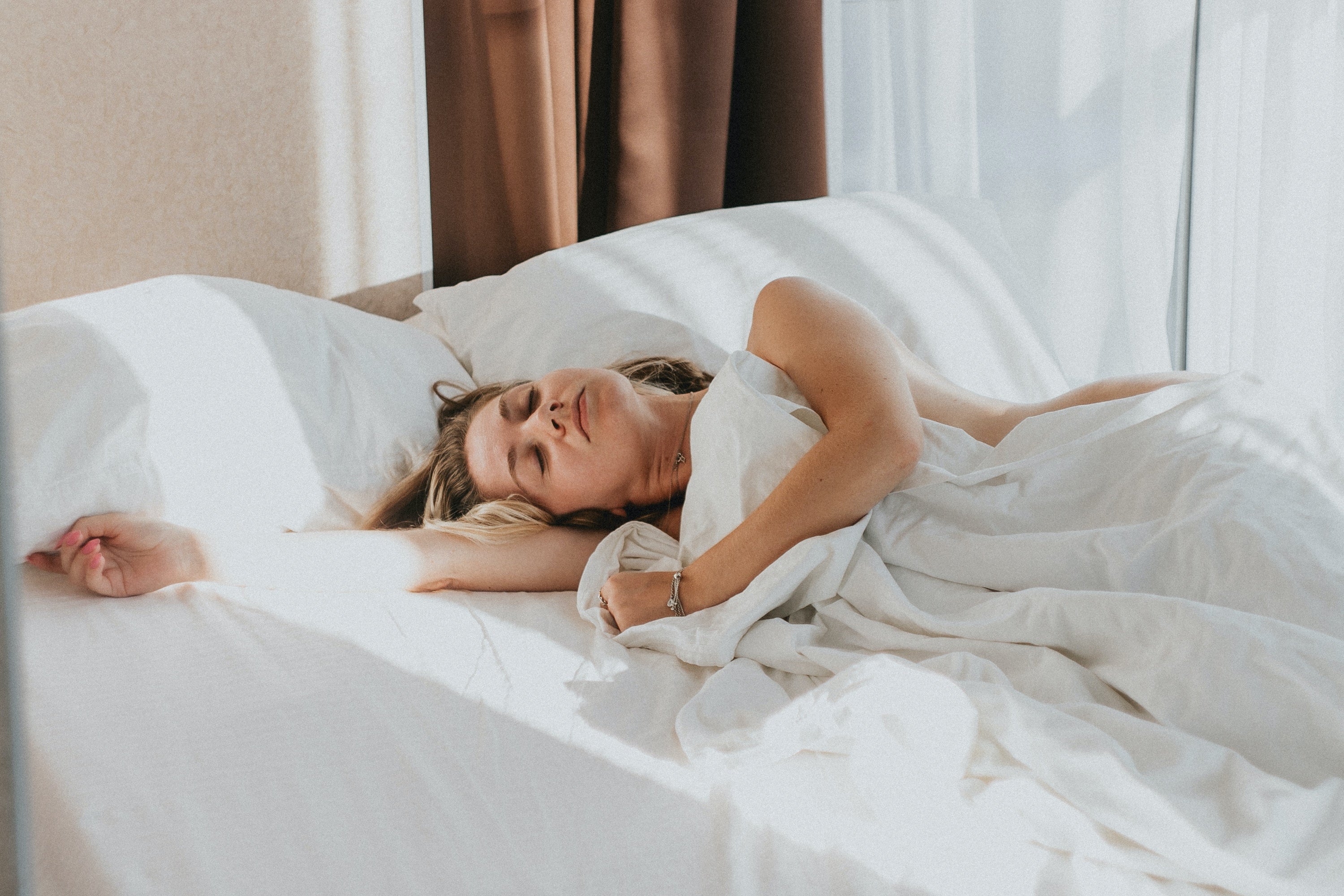Sleeping in a Noisy Home
A quiet sleeping environment is critical for a good night's sleep. Unfortunately, many of us live in or near a noisy place, whether it's traffic noise, environmental noise, roommates, loud appliances, or all of the above.
Trying to get quality sleep in noisy environments can be challenging. Loud sounds can make it difficult to fall asleep or can interrupt the essential REM sleep required for sufficient rest.
Insufficient sleep can have negative consequences on our health, including low mood, reduced attention span, memory loss, poor decision-making, slowed thinking, and lack of energy.
There is hope if you struggle to get a quiet night's sleep due to a noisy environment. We've reviewed several solutions to managing loud noises in your sleeping environment, from thick curtains to a white noise machine.
How does noise affect sleep?
Hearing loud noises during sleep may cause you to wake up suddenly during the night. Persistent background noise can cause irritation or distract from being able to fall asleep soundly.
Disruptive sounds that interrupt sleep can come from anywhere: from the normal noise pollution of living in a busy area, from loud neighbors or appliances, plumbing, or even a squirrel living in the tree outside your bedroom window.
A light sleeper may find themselves suddenly jolted by the slightest traffic noise. Sudden noises from a slamming door can wake even the deepest sleeper. Those suffering from insomnia may be unable to fall asleep due to even the most innocuous unwanted noise source.
Even if you don't wake up completely, noise disturbances can interfere with the essential sleep stages required for restful sleep.
When you don't get enough deep sleep, your body can't repair itself, which can lead to various long-term health consequences. It's essential to prioritize undisrupted sleep to avoid such issues.
Tips for reducing noise
The ideal scenario for getting a good night's sleep is to create a dark, quiet sleeping environment.
That said, noise pollution is nearly inevitable for those living in the city or near a busy street. Even country dwellers may find disruptive sounds from the natural environment a hindrance to a perfectly quiet room.
There are some options to still prioritize sleep quality even in a noisy environment.
1.) Soundproof your room
Soundproofing your room can be as easy as adding soft surfaces to your bedroom decor.
Soft surfaces absorb sound, so adding thick furniture or bedroom accessories may help reduce loud sounds.
Thick curtains, such as blackout curtains or noise-blocking curtains, can help block sound from the outside. Blackout curtains, such as Mellanni's triple weave burgundy or blue quatrefoil curtains, are also an excellent option for keeping UV light or light from the streets from disrupting sleep.
2.) Earplugs
Earplugs are a great option for blocking noise if soundproofing isn't an option or for noise that a soundproof space can't diminish, such as snoring from a partner.
Foam earplugs are easy to acquire and can be purchased online, in your local pharmacy, or even in some gas stations.
They are also an excellent option for traveling. Ear plugs can easily be packed in a purse or overnight bag and used to reduce environmental noise from trains, airplanes, or noisy hotel rooms.
For those that find it uncomfortable to wear earplugs, custom earplugs can be created for a better fit inside the ear canal.
3.) Turn off or fix noisy appliances
If your refrigerator is so loud that you can hear it from your bedroom, it's probably due for repair.
Many appliances, such as air conditioners, dishwashers, and washing machines, have a whisper setting, perfect for running overnight without disturbing your sleep.
Some sleepers find that ambient sounds, such as those created by a fan or air conditioner, may actually help to combat sleep-interrupting noises.
If the background noise from appliances helps create a more peaceful sleeping environment, let that work in your favor.
4.) Silence smartphone alerts and turn off electronic devices
Most of us use our cell phone as an alarm clock, meaning our phone sits next to us on the bedside table as we sleep. There is nothing more disturbing to a quiet night's sleep than an ill-timed phone call or a series of loud message alerts right in your ear.
Put your cell on do not disturb or silence notifications. Turning off electronic devices up to two hours before bed is ideal for a good night's sleep. If your phone doubles as your alarm clock, or you use apps for white noise, ambient sounds, or other relaxing background noise, limiting exposure to sound notifications and blue light before bed is the next best thing.
If falling asleep to a series or podcast is part of your bedtime routine, be sure to set a sleep timer to turn off sounds from your device once you drift off.
5.) Talk things out
If your roommates or neighbors are a significant source of noise in your environment, prioritize good sleep by chatting with them to find a solution to reduce noise in your household.
If your partner snores, discuss options to help manage their snoring. There are many opportunities for reducing snoring, such as changing sleeping positions, introducing extra pillows, or using an anti-snoring device like a mouthpiece.
Managing a noisy sleeping environment
If reducing noise or creating a noiseless sleeping space isn't possible, there are a few alternatives for achieving restful sleep, including introducing soothing sounds and relaxing background noise into your sleep environment.
White noise machine
Studies suggest that white noise can have a positive effect on sleep quality.
What is white noise? White noise is a noise that includes every frequency in the full spectrum of audible sound.
White noise machines can be a great option to help get a good night's sleep when your sleeping environment isn't an ideal level of quiet.
If investing in a white noise machine isn't an option, a white noise app or white noise youtube channel are excellent alternatives.
Music
Soft music can be a great option to help distract from unpleasant or unwanted noise while you sleep.
Choose music with a slower tempo and a low volume to avoid disturbing your sleep. Classical music and instrumental music are good options to consider, while loud music, music with varying tempos, uneven loudness, or complicated lyrics may make falling asleep more difficult.
Nature sounds
Nature sounds such as rain, a creek, or the sound of waves crashing can relax and help you drift to sleep.
Many sound machines, YouTube channels, and apps can mimic these sounds. These sounds are also effective in drowning out other unpleasant background noises.
Other tips for a good night's sleep
Aside from keeping your sleep environment as quiet as possible, there are other steps you can take to ensure you're getting sufficient sleep.
-
Temperature. The ideal sleeping temperature is between 60 and 67 degrees Fahrenheit. A cool room can help you fall asleep faster and stay asleep longer. Consider investing in a good-quality thermostat or air conditioning unit to regulate the temperature in your bedroom.
-
Bedtime routine. Having a bedtime routine can significantly improve your sleep quality. Try going to bed and waking up at the same time every night to help support our natural circadian rhythms. Dedicate sufficient time for a relaxing wind-down before bed, such as reading a book, taking a warm bath, or practicing relaxation techniques such as deep breathing.
-
Bedding. Having soft, comfortable sheets is essential for sleeping well. Invest in good-quality bedding that is comfortable and breathable to help regulate your body temperature and keep you comfortable throughout the night.
Bottom line
Getting a good night's sleep is essential for your physical and mental health. While it's not always possible to have a tranquil sleep environment, there are many options available to help minimize noise and distractions.
Experiment with techniques like white noise machines, music, and nature sounds to find what works best for you. Consider other factors that can impact your sleep quality, such as temperature, bedtime routine, and bedding.
By taking steps to create a peaceful sleep environment, you can improve the quality and quantity of your sleep, leading to a happier and healthier you.
Mellanni is dedicated to helping our community get restful sleep.
-
Our Blackout Curtains are a noisy home essential. These thick curtains can help block both sound and light.
-
Check out our various sheet sets for the softest, highest-quality sheets on the market.
-
Consider our premium body pillow to feel comfortable in any sleeping position. Does your partner snore? A body pillow can help them adopt a sleeping position, such as side sleeping, to reduce the likelihood of loud snoring interfering with a quiet night's sleep.
-
Our premium bed pillows are soft yet firm, providing support in every sleeping environment.
-
Our Microplsh Mattress Pad feels like sleeping on a cloud. If you can't have an ultra-quiet sleeping environment, at least have an ultra-comfortable one.



